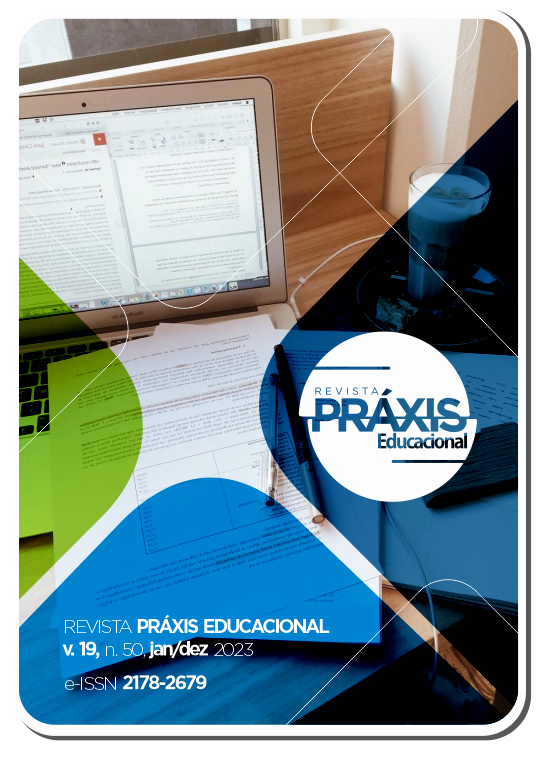Inclusion of children with autism: perspectives on an intervention at school
DOI:
https://doi.org/10.22481/praxisedu.v19i50.12943Keywords:
autism, inclusion, VygotiskiAbstract
This work presentes the results of a qualitative, applied and intervention research conducted with mothers, teachers and psychopedagogues of children with autism. That research, focused on the development of higher mental functions of two children, was
done in the classroom and in other school environments, before and after four months of daily work. The analyses of the data were focused on two aspects: their opinion on the method created and applied by the researcher, and their perspectives on the children’s evolution after the intervention. The interviewees reported noticing the children's evolution in various mental functions and the reduction of some ASD symptoms after the intervention. Our data also point to the need of a work with children with autism from a perspective which encompasses all aspects of their development, avoiding repetitive and plastered activities.
Downloads
Metrics
References
ALBUQUERQUE, Isis.; BENITEZ, Priscila. O brincar e a criança com transtorno do espectro autista: revisão de estudos brasileiros. Revista Ibero-Americana de Estudos em Educação, Araraquara, v. 15, n. 4, p. 1939–1953, 2020. DOI: 10.21723/riaee.v15i4.12811. Disponível em: https://periodicos.fclar.unesp.br/iberoamericana/article/view/12811. Acesso em: 16 nov. 2022.
BRASIL. Constituição da República Federativa do Brasil: promulgada em 5 de outubro de 1988. 4. ed. São Paulo: Saraiva, 1990.
COSTA, Valdelúcia Alves da. Formação de professores e sua relação com a educação inclusiva: desafios à experiência teórica na práxis pedagógica. Revista Educação Especial, [s. l.], v. 28, n. 52, p. 405–416, 2015. DOI: 10.5902/1984686X9628 Disponível em: https://periodicos.ufsm.br/educacaoespecial/article/view/9628 Acessp em: 16 nov. 2022.
MOURA, Alanna Moura e; SANTOS, Bruna Monyara Lima dos; MARCHESINI, Anna Lúcia Sampaio. O brincar e sua influência no desenvolvimento de crianças com transtorno do espectro autista. Cadernos de Pós-Graduação Distúrbio e Desenvolvimento, São Paulo, v. 21, n. 1, p. 24-38, jun. 2021. DOI: 10.5935/cadernosdisturbios.v21n1p24-38 Disponível em: http://pepsic.bvsalud.org/scielo.php?script=sci_arttext&pid=S1519-03072021000100003&lng=pt&nrm=iso. Acesso em: 16 nov. 2022.
PIECZARKA, Thiciane; VALDIVIESO, Tiago V. Vínculo afetivo, aprendizagem e autismo: reflexões sobre a relação professor-aluno. Revista Cógnito, Curitiba, v. 3, n. 1, p. 59 - 77, ago/2021. DOI: 10.53546/2674-5593.cog.2021.52 Disponível em: https://revista.fidelis.edu.br/index.php/cognito/article/view/52 Acesso em: 16 nov. 2022
SZUNDY, Paula T. C.; FABRÍCIO, Branca F. Linguística Aplicada e indisciplinaridade no Brasil: promovendo diálogos, brumas e projetando desafios. In: SZUNDY, Paula. T. C. et al. (org.) Inovações e desafios epistemológicos em linguística aplicada: perspectivas sul-americanas. Campinas: Pontes Editores, 2019, p. 63-89.
VIGOTSKI, Lev Semenovich. Aprendizagem e Desenvolvimento Intelectual na Idade Escolar. In: LEONTIEV, Alexis. Linguagem, Desenvolvimento e Aprendizagem. Tradução de Maria da Pena Villalobos. 11 ed. São Paulo: Ícone, 2010.
VIGOTSKI, Lev Semenovich. Aprendizagem e Desenvolvimento Intelectual na Idade Escolar. In: Psicologia e pedagogia: bases psicológicas da aprendizagem e do desenvolvimento / Aléxis Leontiev... [et al.]; Tradução de Rubens Eduardo Frias. São Paulo: Centauro, 2005.
VIGOTSKI, Lev Semenovich. Obras Escogidas. 2 ed. Moscú: Editorial Pedagóguika, 1997. v. 1.
VIGOTSKI, Lev Semenovich. A formação social da mente: o desenvolvimento dos processos psicológicos superiores. Organização: Michael Cole, Vera Johnsteiner, Sylvia Scribner e Ellen Souberman. Tradução: José Cipolla Neto, Luiz Silveira Menna Barreto e Solange Castro Afeche. São Paulo: Martins Fontes, 1994. 191p.
Downloads
Published
How to Cite
Issue
Section
License
Copyright (c) 2023 Práxis Educacional

This work is licensed under a Creative Commons Attribution-ShareAlike 4.0 International License.
You are free to:
Share - copy and redistribute the material in any medium or format; Adapt - remix, transform, and build from the material for any purpose, even commercially. This license is acceptable for Free Cultural Works. The licensor cannot revoke these freedoms as long as you follow the terms of the license.
Under the following terms:
Attribution - You must appropriately give credit, provide a link to the license, and indicate if any changes have been made. You may do so in any reasonable way, but not in a way that suggests that you or your use is endorsed by the licensor.
There are no additional restrictions - You cannot apply legal terms or technological measures that legally restrict others to make any use permitted by the license.










